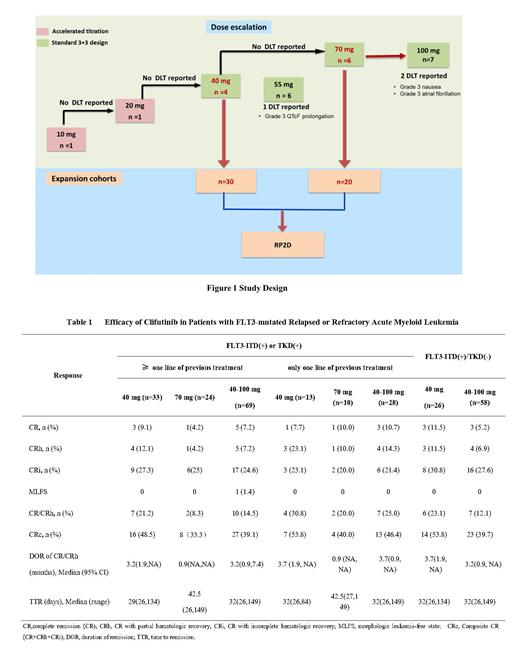Background: Patients with relapsed/ refractory (R/R) FLT3-internal tandem duplication positive (FLT3-ITD+) acute myeloid leukemia (AML) have limited treatment options and poor prognosis. Clifutinib is a novel, highly selective, oral FLT-3 inhibitor with potent activity against FLT3-ITD(+) leukemic models both in vitro and in vivo. This study is a first-in-human study of clifutinib, with the purpose of evaluating the safety, tolerability, efficacy, and pharmacokinetic (PK) profile in Chinese patients with R/R FLT3-mutated AML (NCT04827069).
Methods: Patients aged ≥18 years with AML who were refractory to ≥ 2 cycles of standard induction chemotherapy or relapsed after achieving remission from previous treatments were enrolled. Previous use of FLT3 inhibitors were allowed. The study included two parts, a dose-escalation part (10 to 100 mg/day cohorts) and a dose-expansion part (40 and 70 mg/day cohorts). The primary endpoints were safety and tolerability, and the secondary endpoints were efficacy [CR(complete remission)/CRh (complete remission with partial hematologic recovery) rate, composite complete remission (CRc: CR+CRh+CRi, CRi defined as complete remission with incomplete hematological recovery) rate, TTR (time to remission), duration of remission (DOR), and overall survival (OS)] and pharmacokinetics (PK).
Results: As of May 2023, 75 patients (pts) were enrolled (Figure 1), with a median age of 55 years (range:18-80), and 96.0% pts were FLT3-ITD(+) or TKD(+) [80.0% with ITD(+)/TKD(-), 9.3% with ITD(+)/TKD(UK), 5.3% with ITD(+)/TKD(+), 1.3% with ITD(-)/TKD(+)], 58.7% pts had received ≥2 lines of previous treatment, and 32.0% pts exposed to FLT3 inhibitors. 3 pts experienced dose-limiting toxicities (DLT): one out of 6 pts in the 55 mg/day cohort (Grade 3 QTcF prolongation with ΔQTcF =71 ms) and 2 out of 6 pts in the 100 mg/day cohort (Grade 3 nausea and Grade 3 atrial fibrillation). Therefore, the maximum tolerated dose of clifutinib was 70 mg/day. The most common (rate ≥20%) treatment-related adverse events (TRAEs) included leukopenia (70.7%), thrombocytopenia (68%), neutropenia (64%), anemia (48%), lymphopenia (26.7%), pneumonia (26.7%), hypokalemia (26.7%), aspartate aminotransferase increased (22.7%), alkaline phosphatase increased (21.3%) and alanine aminotransferase increased (20.0%). Grade ≥3 TRAEs occurring in ≥20% pts were leukopenia, thrombocytopenia, neutropenia, anemia, lymphopenia, and pneumonia. Approximately dose-proportional PK parameters were observed across 40-100 mg/day dose range for both single and repeat dosing (the parent drug might approach saturation at 100 mg/day), and median t max ranged from 2 to 6 hours.
For efficacy, responses occurred in 28 (40.6%) of 69 FLT3-ITD(+) or TKD(+) efficacy evaluable pts, including 5 (7.2%) CR, 5(7.2%) CRh, 17 (24.6%) CRi, 1 (1.4%) MLFS, and the median TTR was 32 days (range: 26-149 days). The efficacy was better in the 40 mg/day group compared to 70 mg/day and 40-100 mg/day groups, with CR/CRh rate of 21.2% (7/33) vs 8.3% (2/24) vs 14.5% (10/69), CRc rate of 48.5% (16/33) vs 33.3% (8/24) vs 39.1% (27/69), and median DOR of CR/CRh was 3.2 months (95% CI:1.9, NA) vs 0.9 months (95% CI: NA, NA ) vs 3.2 months (95% CI: 0.9, 7.4 ), the median OS was 6.5 months vs 5.4 months vs 6.3 months, respectively. Among FLT3-ITD(+)/TKD(-) subjects administered with clifutinib 40 mg/day, the CR/CRh rate was 23.1% (6/26) with 3 patients achieved CR, median DOR of CR/CRh was 3.7 months, the CRc rate was 53.8% (14/26), and median OS was 7.4 months. Compared to FLT3-ITD(+) or TKD(+) pts, 40 mg dose group exhibited better efficacy in FLT3-ITD(+)/TKD(-) pts. In addition, clifutinib exhibited more potent anti-leukaemic activity in patients received only one line of previous treatment. Among patients experienced only one line treatment of 40 mg dose group, the CR/CRh rate was 30.8% (4/13), the CRc rate was 53.8% (7/13), and the median OS was 7.9 months (Table 1) .
Conclusion: This phase 1 study has demonstrated an acceptable safety profile and a significant anti-leukaemic activity of clifutinib in FLT3 mutant R/R AML, with the best response at the dose of 40 mg/day in FLT3-ITD(+)/TKD(-) AML. A confirmatory phase 3 study is currently ongoing to further evaluate the efficacy and safety of clifutinib dosed at 40 mg/day in R/R AML pts after first-line therapy with FLT3-ITD(+)/TKD(-) (NCT05586074).
Keywords: Acute myeloid leukemia, FLT3 inhibitor, Clifutinib
Disclosures
No relevant conflicts of interest to declare.


This feature is available to Subscribers Only
Sign In or Create an Account Close Modal